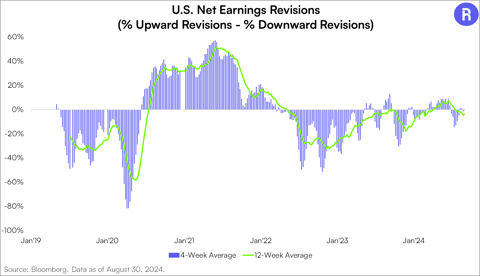Roundhill Roundup: Markets Go Up
Last year, a knock on the market was its lack of breadth, whereby a small number of names were responsible for driving the majority of returns. Of course, we know that those stocks were the Magnificent Seven stocks, which contributed 57% of the S&P 500’s 26% return. Upon reflection, this narrative wasn’t too off base as the concentration was driven by investors favoring companies that offered high quality growth potential coupled with strong profit margins. We detailed this phenomenon in a blog post published in early December 2023.
Through the end of May 2024, the Magnificent Seven stocks have contributed 50% of returns. Four Magnificent Seven stocks comprise the top four spots with Eli Lilly slotting in fifth. Financials like Berkshire Hathaway and JPMorgan can be found in the top 10 as well. So, there’s been some broadening, but investors have favored companies exposed to themes like Generative AI and GLP-1. This strength comes when markets have ratched down their expectations of rate cuts from the Fed which was a recent narrative used by the bulls.
Top 10 S&P 500 Contributors

Source: Bloomberg, as of May 31, 2024. For illustrative purposes, the holdings of the S&P 500 are represented by the iShares Core S&P 500 ETF (IVV).
Positive performance has coincided with subdued volatility. In fact, volatility is so low that it’s approaching levels last seen in pre-Volmaggedon 2017. The VIX closed May at 12.92, only slightly above the 2017 average of 11.09. That year, the VIX was low due to several contributing factors. The global economy experienced steady growth, which reduced uncertainty and instilled confidence in markets. In addition, central banks maintained low interest rates, supporting market stability and encouraging investment. Strong corporate earnings reports further boosted investor sentiment, while relative political stability and the absence of major geopolitical events contributed to an extremely low volatility environment.
Of course, the 2024 backdrop is far from that of 2017. The VIX is low this year due to several factors that have created a stable market environment. With the realized volatility for the S&P 500 being exceptionally low, it has limited the demand for downside hedges, as market participants feel less need to protect against large drops in stock prices. Additionally, the Fed's data-dependent stance and the anticipation of eventual interest rate cuts have reduced market uncertainty. Furthermore, increased corporate share buybacks and a weaker US dollar have contributed to the overall reduction in market volatility.
Stock Market Volatility Approaching 2017 Levels

Source: Bloomberg, May 31, 1994 through May 31, 2024.
The US Misery Index was a concept first introduced by economist Arthur Okun in the 1970s. It gained prominence during the economic struggles of that decade, particularly during periods of stagflation when both inflation and unemployment were high. The US Misery Index, calculated as the sum of the unemployment and inflation rates, measures economic discomfort. It's a good barometer because it reflects the real-world impact of economic conditions, highlighting periods of economic stress and potential hardship for the average citizen. As of the most recent data, the Misery Index has fallen from its July 2022 high of 12.70% to 7.30% today.1 The declines have been driven entirely by inflation decreasing from over 9% to 3.40% today. So, while inflation may not be at levels most would prefer, price increases have slowed down and unemployment has remained relatively steady. The jump in Consumer Confidence Expectations from 66.4 to 74.6 is an indication that sentiment may be improving as well.2
US Misery Index has Declined

Source: Bloomberg, May 31, 1994 through April 30, 2024.
All of the above points to markets remaining supported as we enter the summer months. Now that earnings season is behind us, markets will likely be driven by developments in inflation and employment. And, whether we want to admit it or not, the US economy has been incredibly resilient as certain emerging markets have started to build momentum. While the consumer, especially on the lower end does appear to be facing the brunt of price increases, we don’t anticipate a material change in the economic environment occurring either positively or negatively in the near term. In other words, until something changes or there’s an exogenous shock, investors will likely stick to what’s working. To us, this means that the Generative AI and GLP-1 themes will likely continue to be the favored areas of investors.
Not an offer: This document does not constitute advice or a recommendation or offer to sell or a solicitation to deal in any security or financial product. It is provided for information purposes only and on the understanding that the recipient has sufficient knowledge and experience to be able to understand and make their own evaluation of the proposals and services described herein, any risks associated therewith and any related legal, tax, accounting or other material considerations. To the extent that the reader has any questions regarding the applicability of any specific issue discussed above to their specific portfolio or situation, prospective investors are encouraged to contact 1-855-561-5728 or consult with the professional advisor of their choosing.
Forward-looking statements: Certain information contained herein constitutes “forward-looking statements,” which can be identified by the use of forward-looking terminology such as “may,” “will,” “should,” “expect,” “anticipate,” “project,” “estimate,” “intend,” “continue,” or “believe,” or the negatives thereof or other variations thereon or comparable terminology. Due to various risks and uncertainties, actual events, results or actual performance may differ materially from those reflected or contemplated in such forward-looking statements. Nothing contained herein may be relied upon as a guarantee, promise, assurance or a representation as to the future.
Use of Third-party Information: Certain information contained herein has been obtained from third party sources and such information has not been independently verified by Roundhill Financial Inc. No representation, warranty, or undertaking, expressed or implied, is given to the accuracy or completeness of such information by Roundhill Financial Inc. or any other person. While such sources are believed to be reliable, Roundhill Financial Inc. does not assume any responsibility for the accuracy or completeness of such information. Roundhill Financial Inc. does not undertake any obligation to update the information contained herein as of any future date.



-2.png?width=480&name=Roundup%20-%20Landscape%203%20(1)-2.png)
